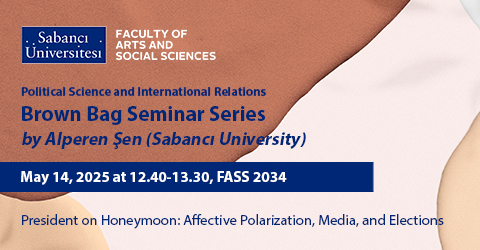Brown Bag Seminar by Alperen Şen (Sabancı University)
President on Honeymoon: Affective Polarization, Media, and Elections
During the last decades, students of polarization have shown that polarization between political groups has been increasing and becoming a chronic problem. Despite the growing number of studies on the relationship between polarization and elections, few studies have analyzed the winner-loser gap in affective polarization. Using data from the American National Election Study for six elections, I find that winners become more polarized and losers become less polarized after the elections. This change is mainly coming from both groups' increased feeling for the (newly) elected President. Moreover, this effect is conditional on consuming high levels of political content in the media. However, the context of the elections and the differences in campaigns and candidates have different impacts on this effect. This counterintuitive finding offers valuable insights into addressing the issue of polarization.
